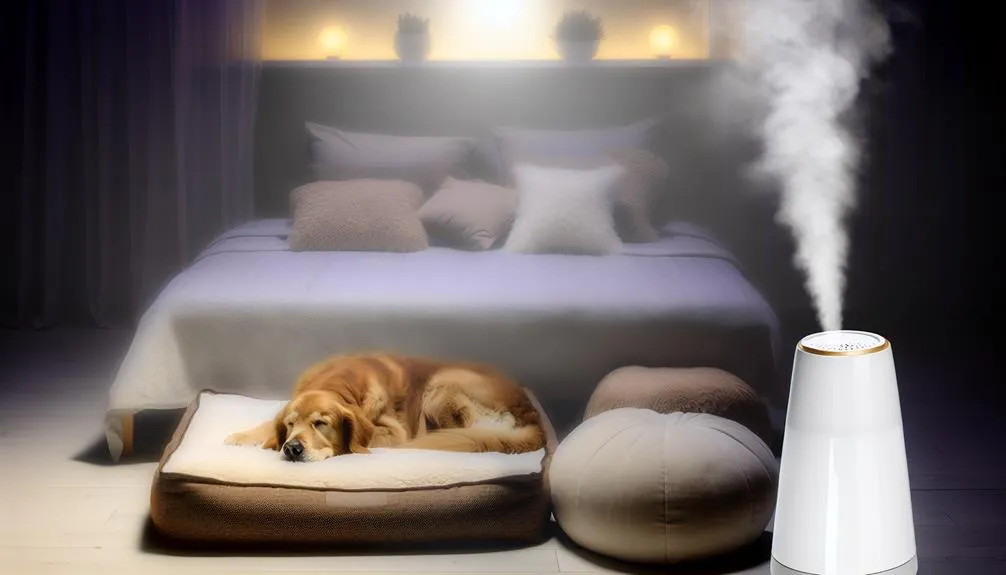
Why Do Dogs Snore
You might've noticed your dog snoring soundly beside you, and it can pique your curiosity about why this happens. It's not just a quirky habit; several factors influence your dog's snoring, including their breed, age, and even their sleeping position. While some snoring is perfectly normal, there are instances when it can signal underlying health issues that shouldn't be overlooked. Understanding the nuances of canine snoring could provide valuable insights into your pet's well-being, leaving you to wonder what specific factors might be at play in your dog's case.
Common Causes of Dog Snoring
Snoring in dogs can often sound like a freight train rumbling through your living room, and it can be concerning for pet owners. Understanding the common causes of dog snoring can help alleviate your worries. One significant factor is age. As dogs get older, their muscle tone decreases, leading to the relaxation of tissues in the throat. This relaxation can contribute to snoring, especially during deep sleep. If your dog's snoring becomes more pronounced with age, it may simply be a natural part of the aging process.
Environmental influences also play an important role in your dog's snoring habits. Allergens like dust, pollen, or smoke can irritate their airways, leading to nasal congestion and snoring. If you notice that your dog snores more when certain environmental factors are present, such as during allergy season or in a smoky room, it might be time to think about a change in their surroundings.
Additionally, sleeping positions can affect snoring. A dog that sleeps on its back may find its airway obstructed, leading to more pronounced snoring. Adjusting your dog's sleeping arrangement could potentially help.
While snoring is often harmless, monitoring any changes in frequency or volume is vital. If it seems excessive or is accompanied by other symptoms, consulting your veterinarian is a wise move. They can provide a thorough assessment to rule out any underlying health issues, ensuring your furry friend remains comfortable and healthy.
Breed-Specific Snoring Patterns
Certain breeds are more prone to snoring due to their unique physical characteristics. For instance, brachycephalic breeds, like bulldogs, have short snouts that often lead to obstructed airways. This results in bulldog snoring, which can be loud and disruptive. On the other hand, longer-nosed breeds, such as dachshunds, can produce distinct vibrations while sleeping, often influenced by their anatomy and sleeping positions.
To illustrate these breed-specific patterns, here's a comparison of common breeds and their snoring tendencies:
| Breed | Snoring Characteristics |
|---|---|
| Bulldog | Loud, often caused by airway obstruction |
| Dachshund | Soft, rhythmic vibrations |
| Pug | Frequent snoring due to facial structure |
| Boxer | Moderate snoring, especially when relaxed |
Understanding these patterns can help you manage your dog's sleep environment better. If you own a bulldog, you might notice that snoring increases as they become more relaxed. Conversely, if you have a dachshund, the vibrations might be subtle but consistent, adding a unique soundscape to your home.
While snoring can be normal, it's important to monitor your dog's breathing patterns. If you notice significant changes or signs of distress, consulting a veterinarian can provide peace of mind. Recognizing these breed-specific patterns can help you better understand your furry friend's sleeping habits and guarantee they have a restful night.
Impact of Sleeping Positions

When dogs settle into various sleeping positions, their body mechanics can particularly influence their snoring patterns. Just like humans, your dog's sleeping habits greatly affect their comfort levels and airflow during sleep. If your pup curls up tightly, this position might restrict airflow, leading to increased snoring sounds. Conversely, if they stretch out fully, they may experience better airflow, potentially reducing snoring.
The position in which your dog sleeps also correlates with their breed and individual anatomy. For instance, brachycephalic breeds, like Bulldogs and Pugs, often snore due to their short snouts and compressed airways. If these dogs sleep curled up, their breathing pathways can become even more constricted, exacerbating the snoring. On the other hand, a dog that sprawls on their side or back may find it easier to breathe, often resulting in quieter nights.
It's essential to reflect on your dog's comfort levels when evaluating their sleeping arrangements. Providing a supportive bed or adjusting their sleeping surface can lead to improvements in both comfort and snoring. You might notice that when you create a cozy and spacious area for your dog to sleep, they adopt a more relaxed position, which could lessen their snoring.
When Snoring Indicates Health Issues
Your dog's snoring can sometimes signal underlying health issues that warrant attention. While snoring is common, persistent or loud snoring might indicate problems with your dog's respiratory health. Understanding these signs can help you seek a timely snoring diagnosis to guarantee your furry friend remains healthy and comfortable.
| Possible Health Issues | Symptoms to Watch For |
|---|---|
| Obstructive Sleep Apnea | Loud, intermittent snoring; choking sounds during sleep |
| Allergies | Sneezing, nasal discharge, or itchy skin |
| Respiratory Infections | Coughing, labored breathing, lethargy |
If your dog exhibits any of these symptoms along with snoring, it's important to consult your veterinarian. Conditions like obstructive sleep apnea can lead to serious complications if left untreated. Allergies may cause inflammation in the airways, contributing to snoring. Respiratory infections could also be the culprit, affecting your dog's overall quality of life.
Being proactive about your dog's health can make a significant difference. Keep an eye out for changes in snoring patterns or additional symptoms. A thorough snoring diagnosis from your vet can help identify any underlying issues and guide you in finding the right treatment. Your dog's well-being is paramount, and addressing potential health problems early on guarantees they lead a happy and healthy life.
Tips for Reducing Dog Snoring

Reducing dog snoring often involves a combination of lifestyle adjustments and environmental changes. First, evaluate your dog's sleeping position. If your pup sleeps on its back, try encouraging a side-sleeping position, as this can help keep airways open. You can also provide an orthopedic bed that supports proper alignment.
Next, consider their weight. Obesity can contribute to snoring, so implementing a balanced diet and regular exercise regimen can be essential. Consult your veterinarian for tailored dietary recommendations and suitable activity levels for your dog.
In addition, explore snoring prevention techniques such as using humidifiers in your home. Dry air can irritate your dog's respiratory system, leading to increased snoring. Keeping their sleeping area clean and free from allergens will also promote better airflow.
Establishing calming bedtime routines is important too. Activities like gentle brushing or a short evening walk can help your dog relax before bedtime, reducing stress and potential snoring. Reducing exposure to noise and creating a quiet sleeping environment can also notably improve their sleep quality.
Frequently Asked Questions
Can Snoring Affect My Dog's Quality of Sleep?
Yes, snoring can affect your dog's quality of sleep. Snoring symptoms might indicate sleep disturbances, leading to restless nights. It's crucial to monitor your pet's sleep patterns and consult a vet if issues persist.
Is It Normal for Puppies to Snore?
It's normal for puppies to snore occasionally. Their smaller airways can cause unique puppy breathing and snoring habits. While it's usually harmless, monitoring their sleep quality is essential to guarantee they're comfortable and healthy.
Do Older Dogs Snore More Than Younger Ones?
Yes, older dogs often snore more than younger ones. Senior dog anatomy changes can affect their breathing patterns, leading to increased snoring. It's important to monitor their health and consult your vet if concerns arise.
Can Allergies Cause My Dog to Snore?
Your dog might snore like a freight train if allergies are at play. Allergy symptoms can lead to nasal congestion, making it difficult for them to breathe comfortably. Consult your vet for effective solutions.
How Does Weight Affect a Dog's Snoring?
If your dog's overweight, it can greatly impact their respiratory health, leading to increased snoring. Obesity often causes airway obstruction, making it harder for them to breathe, especially during sleep. Managing their weight is essential.
Conclusion
To summarize, snoring in dogs is often harmless, but it can sometimes signal underlying health issues. Curiously, about 30% of dogs snore regularly, with brachycephalic breeds being the most affected. Understanding the common causes and contributing factors can help you address any concerns. If your dog's snoring changes markedly, it's wise to consult your vet. By making a few adjustments, you can help guarantee your furry friend enjoys quieter, more restful nights.
You may also like
Archives
Calendar
| M | T | W | T | F | S | S |
|---|---|---|---|---|---|---|
| 1 | 2 | 3 | 4 | 5 | 6 | |
| 7 | 8 | 9 | 10 | 11 | 12 | 13 |
| 14 | 15 | 16 | 17 | 18 | 19 | 20 |
| 21 | 22 | 23 | 24 | 25 | 26 | 27 |
| 28 | 29 | 30 | ||||
Leave a Reply